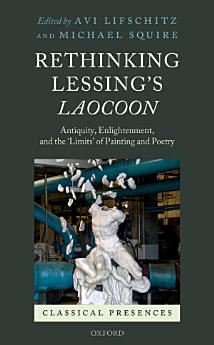Rethinking Lessing's Laocoon: Antiquity, Enlightenment, and the 'Limits' of Painting and Poetry
Avi Lifschitz · Michael Squire
Sep 2017 · Oxford University Press
E-Book
480
Seiten
family_home
Zulässig
info
reportBewertungen und Rezensionen werden nicht geprüft Weitere Informationen
Über dieses E-Book
Gotthold Ephraim Lessing first published Laokoon, oder über die Grenzen der Mahlerey und Poesie (Laocoon, or on the Limits of Painting and Poetry) in 1766. Over the last 250 years, Lessing's essay has exerted an incalculable influence on western critical thinking. Not only has it directed the history of post-Enlightenment aesthetics, it has also shaped the very practices of 'poetry' and 'painting' in a myriad of different ways. In this anthology of specially commissioned chapters - comprising the first ever edited book on the Laocoon in English - a range of leading critical voices has been brought together to reassess Lessing's essay on its 250th anniversary. Combining perspectives from multiple disciplines (including classics, intellectual history, philosophy, aesthetics, media studies, comparative literature, and art history), the book explores the Laocoon from a plethora of critical angles. Chapters discuss Lessing's interpretation of ancient art and poetry, the cultural backdrops of the eighteenth century, and the validity of the Laocoon's observations in the fields of aesthetics, semiotics, and philosophy. The volume shows how the Laocoon exploits Greek and Roman models to sketch the proper spatial and temporal 'limits' (Grenzen) of what Lessing called 'poetry' and 'painting'; at the same time it demonstrates how Lessing's essay is embedded within Enlightenment theories of art, perception, and historical interpretation, as well as within nascent eighteenth-century ideas about the 'scientific' study of Classical antiquity (Altertumswissenschaft). To engage critically with the Laocoon, and to make sense of its legacy over the last 250 years, consequently involves excavating various 'classical presences': by looking back to the Graeco-Roman past, the volume demonstrates, Lessing forged a whole new tradition of modern aesthetics.
Autoren-Profil
Avi Lifschitz is Associate Professor of European History and Fellow of Magdalen College at the University of Oxford. Among his publications are Language and Enlightenment: The Berlin Debates of the Eighteenth Century (OUP, 2012) and the edited volumes Engaging with Rousseau (CUP, 2016) and Epicurus in the Enlightenment (co-edited with Neven Leddy; Voltaire Foundation, 2009). He has held research fellowships at the Clark Library at UCLA, the universities of Göttingen and Halle, and the Wissenschaftskolleg zu Berlin. Michael Squire is Reader in Classical Art at King's College London. His research has explored the interface between ancient art and literature, as well as the critical reception of ancient visual culture; previous books include Image and Text in Graeco-Roman Antiquity (CUP, 2009), The Iliad in a Nutshell: Visualizing Epic on the Tabulae Iliacae (OUP, 2011), and The Art of the Body: Antiquity and its Legacy (I. B. Tauris, 2011). He has held fellowships at Cambridge, Cologne, Harvard, Munich, Stanford, and the Wissenschaftskolleg zu Berlin.
Dieses E-Book bewerten
Deine Meinung ist gefragt!
Informationen zum Lesen
Smartphones und Tablets
Nachdem du die Google Play Bücher App für Android und iPad/iPhone installiert hast, wird diese automatisch mit deinem Konto synchronisiert, sodass du auch unterwegs online und offline lesen kannst.
Laptops und Computer
Im Webbrowser auf deinem Computer kannst du dir Hörbucher anhören, die du bei Google Play gekauft hast.
E-Reader und andere Geräte
Wenn du Bücher auf E-Ink-Geräten lesen möchtest, beispielsweise auf einem Kobo eReader, lade eine Datei herunter und übertrage sie auf dein Gerät. Eine ausführliche Anleitung zum Übertragen der Dateien auf unterstützte E-Reader findest du in der Hilfe.







